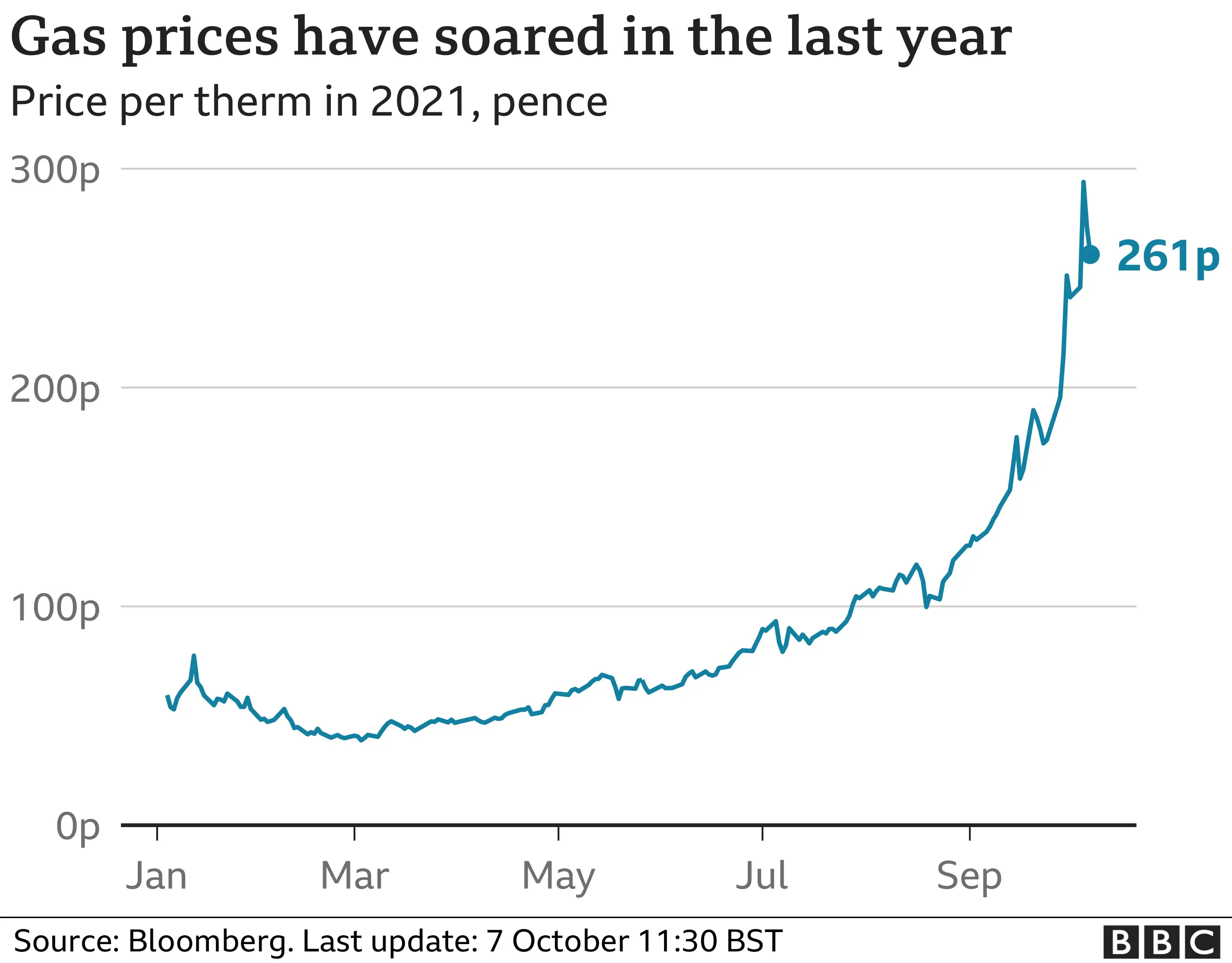Firms warn of price rises as energy costs soar
 Getty Images
Getty ImagesHigh energy costs are forcing manufacturers to warn of higher prices for their goods as they pass on increases to consumers.
Iceland boss Richard Walker said higher energy bills and other costs meant price rises were now "inevitable".
The warning came as analysts predicted that household energy bills could rise by hundreds of pounds next year.
They said the energy price cap, which protects domestic consumers, could soar by £400 in the spring.
Cornwall Insight forecasts that the energy price cap will rise to about £1,660 by next summer.
That is about 30% higher than the record £1,277 level for the cap set for winter 2021-22, which began at the start of October.

"With wholesale gas and electricity prices continuing to reach new records, successive supplier exits during September 2021 and a new level for the default tariff cap, the Great British energy market remains on edge for fresh volatility and further consolidation," said Craig Lowrey, senior consultant at Cornwall Insight.
Energy regulator Ofgem said the price cap "will ensure that consumers don't pay more than is absolutely necessary this winter".
But if gas prices stay high, the price cap will rise, Ofgem said.
The regulator said its "number one priority is to protect customers", but acknowledged "this is a worrying time for many people".
But while the price cap helps households, there is no such safeguard for businesses, which have to absorb the full impact of rising global energy prices.
Mr Walker warned that Iceland's energy bill would go up by £20m next year. Alongside higher salaries to address lorry driver shortages and other new costs, he said grocery prices would have to increase.
"It's inevitable that we will see price rises," he told the BBC. "The UK supermarket industry is one of the most competitive in the world.
"Our margins are very very tight and we're not an endless sponge that can just absorb all of these different cost increases."
'Horrendous' price rises
Andrew Large, director general of the Confederation of Paper Industries, said: "This is a highly inflationary situation for the British economy and members will clearly be in a position where they do try to pass those costs on to consumers where they can."
One paper manufacturer, the Northwood Group, said the industry had been "left to fend for itself" in the face of "horrendous" knock-on effects from the gas price rise.
"The spike [in gas prices] that we have seen since January is equivalent to a 550% price increase, which of course destroys any industrial planning," said chairman Paul Fecher.
Laura Cohen, chief executive of the British Ceramic Confederation, said many of her member firms could even be forced to stop production "due to uneconomic higher energy costs".
This could cause "severe damage" to production facilities such as brick kilns, which could not easily be turned off at short notice, she said.
Meanwhile, Business Secretary Kwasi Kwarteng has said that by decarbonising the UK's power supply, the country will protect customers from volatile fossil fuel prices.
"The UK so far, as many of you know, has made great progress in diversifying our energy mix. But we are still very dependent, perhaps too dependent, on fossil fuels and their volatile prices," he told a conference organised by trade body Energy UK.
He said that the government's recent pledge to decarbonise the electricity grid by 2035 - 15 years ahead of the previous target - would help.
"Our homes and businesses will be powered by affordable, clean and secure electricity generated here in the UK, for people in the UK," Mr Kwarteng said.
 Getty Images
Getty ImagesThe Energy Shop - a price comparison site - warned people to prepare themselves for even greater increases in household bills.
It said that the next increase in the price cap, due to come in from 1 April 2022, could be £500 or even higher.
Founder Joe Malinowski warned: "If things don't settle down soon, increases of £600, £700 or even £800 cannot be ruled out."
Nine energy suppliers have already collapsed in recent weeks and more could be facing the same fate.
They were unable to keep their price promises as the wholesale price of gas soared.
Their customers have already seen annual bill increases of hundreds of pounds when they moved to a new provider and away from whichever low-rate fixed deal their supplier had offered.
Some of the heat was drawn from the crisis on Wednesday when Russia said it would increase gas supplies to Europe.
UK wholesale gas prices hit a record high during the day before falling after the Russian intervention.
But price volatility could continue as investors remain nervous about low stockpiles of gas across Europe.


If you feel powerless against international business and politics when watching your domestic energy bill go up, you are in good company.
Normally, customers are urged to get active, search and switch to save money - but not now.
Until recently, the energy price cap was a backstop, protecting the vulnerable. Now it is the most competitive tariff available.
The cap is shielding households from the wild fluctuation in prices seen on the wholesale markets, but that is only a crumb of comfort when bills and prices across the board are still expected to see a sharp increase.
So for now, experts simply advise customers to find ways to save energy, brace themselves and budget for bigger bills. Wrap up for a financial chill that could last longer than the winter.

The energy price cap sets the maximum price suppliers in England, Wales and Scotland can charge customers on a standard - or default - tariff.
That includes the fixed daily amount customers pay, plus the price per unit they pay for electricity and gas.
The cap was increased on 1 October, with about 15 million households facing a 12% rise in energy bills, the biggest jump, to the highest amount, seen since the backstop was introduced in January 2019.
Those on standard tariffs, with typical household levels of energy use, saw an increase of £139 - from £1,138 to £1,277 a year.
Prepayment meter customers with average energy use saw a £153 increase.
That's a far cry from a year previously when on 1 October 2020, the energy price cap was cut by £84, to £1,042.


Will you be affected by rising energy prices? Share your experiences by emailing [email protected].
Please include a contact number if you are willing to speak to a BBC journalist. You can also get in touch in the following ways:
- WhatsApp: +44 7756 165803
- Tweet: @BBC_HaveYourSay
- Upload pictures or video
- Please read our terms & conditions and privacy policy
If you are reading this page and can't see the form you will need to visit the mobile version of the BBC website to submit your question or comment or you can email us at [email protected]. Please include your name, age and location with any submission.


- WORLD LEADERS EXPOSED: One of the biggest offshore leaks in history
- THE NEW LABOUR REVOLUTION: Two powerful personalities at the heart of a political phenomenon

